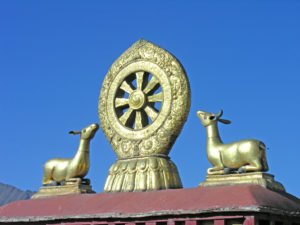In typical Buddhism, there are five precepts, or rules, that the Buddhist willingly takes upon him or herself. Everyone from the average laymen to monastic Buddhists, to the Dalai Lama himself took these principles and made them a way of life.
At a glimpse, these rules are simple, almost overly so. This simplicity is such with most things involving Buddhism, especially all the paths and rules. Simplicity is always key. However, such outright simplicity leaves a lot of room for interpretation.
The precepts, in laymen terms, are don’t kill, don’t steal, don’t engage in sexual misconduct, don’t lie, and don’t get heedlessly drunken. These are all seemingly straightforward rules. That is only at a glance. Upon further examination, the interpretations may become a bit shakier.
Don’t become heedlessly drunken
In the old texts, this refers solely to “fermented drink,” e.g. alcohol. Does that mean one could be a coke fiend and be a true Buddhist? I don’t think so. What about marijuana, something that may even aid in the enlightenment process? I still don’t think so. Will people use these excuses? Of course. Have I ever been heedlessly inebriated and still swore I was a Buddhist? Of course, but these are still things I feel need examining.
Don’t lie
This is straightforward enough, aside from certain instances like a surprise party or how your wife’s dress looks. Is fibbing really lying? How far before it’s too far?
Don’t engage in sexual misconduct
Defining sexual misconduct, especially in today’s society is tough. This is solely a personal choice because sexuality varies so greatly from person to person and culture to culture.
Don’t steal
This seems to be the second most straightforward precept there is, but yet so widely open to interpretation. The more proper translation of the text is not to take what is not willingly given. What if the circumstance is that a newly met friend leaves something in your possession, obviously forgetting without intention, yet you have no means of contact with this person henceforth? Have you stolen the object? It was not willingly given, but there is no means of return. Have you violated a precept?
Don’t kill
Lastly, and absolutely most importantly, don’t kill. It seems the simplest of all but is the most widely misunderstood and causes the most concern. Tibetan monastic Buddhists take whatever food is given to them in their alms bowl, which very well may include meat. The animal was not strictly killed for the use of the monk, but is the monk not still a killer?
 Many monks have abstained from meat after realizing the hypocrisy of this. The Dalai Lama eats meat. He does not need this meat, so not only is he stealing a life that was not readily given to him, but killing all the same, though maybe not by his own hand. Many laymen have given up meat, becoming vegetarians. Some have given up animal products wholly, becoming vegans. To me, this is the only logical choice. But I also am a smoker of cigarettes which are tested on animals (Yes, even American Spirits), killing and maiming many animals in my path. I, too, am a hypocrite.
Many monks have abstained from meat after realizing the hypocrisy of this. The Dalai Lama eats meat. He does not need this meat, so not only is he stealing a life that was not readily given to him, but killing all the same, though maybe not by his own hand. Many laymen have given up meat, becoming vegetarians. Some have given up animal products wholly, becoming vegans. To me, this is the only logical choice. But I also am a smoker of cigarettes which are tested on animals (Yes, even American Spirits), killing and maiming many animals in my path. I, too, am a hypocrite.
So just how far is too far when it comes to the five Buddhist precepts? Are we, as humans, able to interpret and follow the precepts to their fullest, or will our selfish desires and misunderstandings always cloud our judgment? Just how far is too far?





